On Four-Day Workweeks & The Future of Work | #148
July 17th, 2021: Greetings from Hualien. I ended up getting a leftover Moderna dose this past week from the 2.5M doses the US donated to Taiwan so we both have one down, one to go. Also looks like Taiwan is headed back to zero cases, so hoping to go hiking soon.
Today’s issue talks about the four-day workweek. I’ve thought a lot about this topic and I’ve recently decided to tinker with my work schedule. Angie and I are both experimenting with every eight weeks “sabbatical” starting next weekend. We are going to “work” for seven weeks and then do a strict one-week off. Over the last year, I’ve had a lot of maintenance creep from the number of projects I’m working on (which I enjoy) but am missing some of the space that’s needed to stay motivated and creative. I’m also looking forward to the structured deadlines that this might offer.
Guest Posts In August: Starting next week and throughout August, I’ll also be featuring guest posts from some kick-ass Boundless readers who I’ve asked to write about various topics. I think you’ll like it. I’m close to filling the spots, but if you want to make a pitch, just reply.
Here's a shot from our apartment we’ve been locked down in for the past two months. Can’t complain but I’m ready to go hiking:
If you are stumbling upon boundless from the web, consider joining 4,414 other curious humans on this pathless path…
On Four-Day Workweeks & The Future of Work
Becoming self-employed is to wake up to the fact that the world operates on the norms of a full-time paycheck world.
At first, this meant loneliness. What was I supposed to do with my extra time and flexibility if I had no one to hang out with? When I moved abroad, I found communities where remote workers, entrepreneurs, part-time English teachers, and gig workers worked different schedules. I no longer follow a regular schedule.
When I was a consultant, I tried to minimize the amount of work I did. I thought work was necessary but at the same time, I hoped to really like what I did during those hours I was working. I never imagined that I’d stumble upon a completely different relationship with work, once where I like what I’m doing, how I do it (solo), and don’t care when it happens (wrote most of this today, a Saturday).
It took a long time to get to that point but it also made me question our attachment to the workweek. Why haven’t we come up with new ways to work?
Workweek Innovation Stopped 100 Years Ago
As of a couple of years ago, I was convinced that the four-day workweek was a no-brainer "fix" for the current state of work. The reason I thought this was that our idea of a workweek across the world has been "stuck" at 40 hours for almost 100 years. In the late 1800s and early 1900s, there was a steady march of reducing the workweek. From seven days a week to six days to five days.
I was convinced that it was time to act on our “real” problem as predicted by Keynes almost 100 years ago:
Thus for the first time since his creation man will be faced with his real, his permanent problem – how to use his freedom from pressing economic cares, how to occupy the leisure, which science and compound interest will have won for him, to live wisely and agreeably and well.
At the time Keynes thought it was realistic that we might end up with three-hour shifts:
Three-hour shifts or a fifteen-hour week may put off the problem for a great while. For three hours a day is quite enough to satisfy the old Adam in most of us!
This made a lot of sense at the time. In the 1930s, there had been a steady and consistent drop in the number of working hours. Many people moved from seven-day workweeks to six-day workweeks and then from a 48-hour workweek to a 40-hour workweek. Henry Ford is famous for his embrace of the weekend and for the following quote:
“It is high time to rid ourselves of the notion that leisure for workmen is either 'lost time' or a class privilege.”
Some people argue that Ford’s motives were selfish and were aligned with other business leaders who wanted to shift the economy towards a consumption-based one. I don’t want to litigate that debate, but many people point to this inflection point as a time in which the natural progress of the workweek paused. Countries like the US stopped shortening the workweek and over time we have forgotten why we worked.
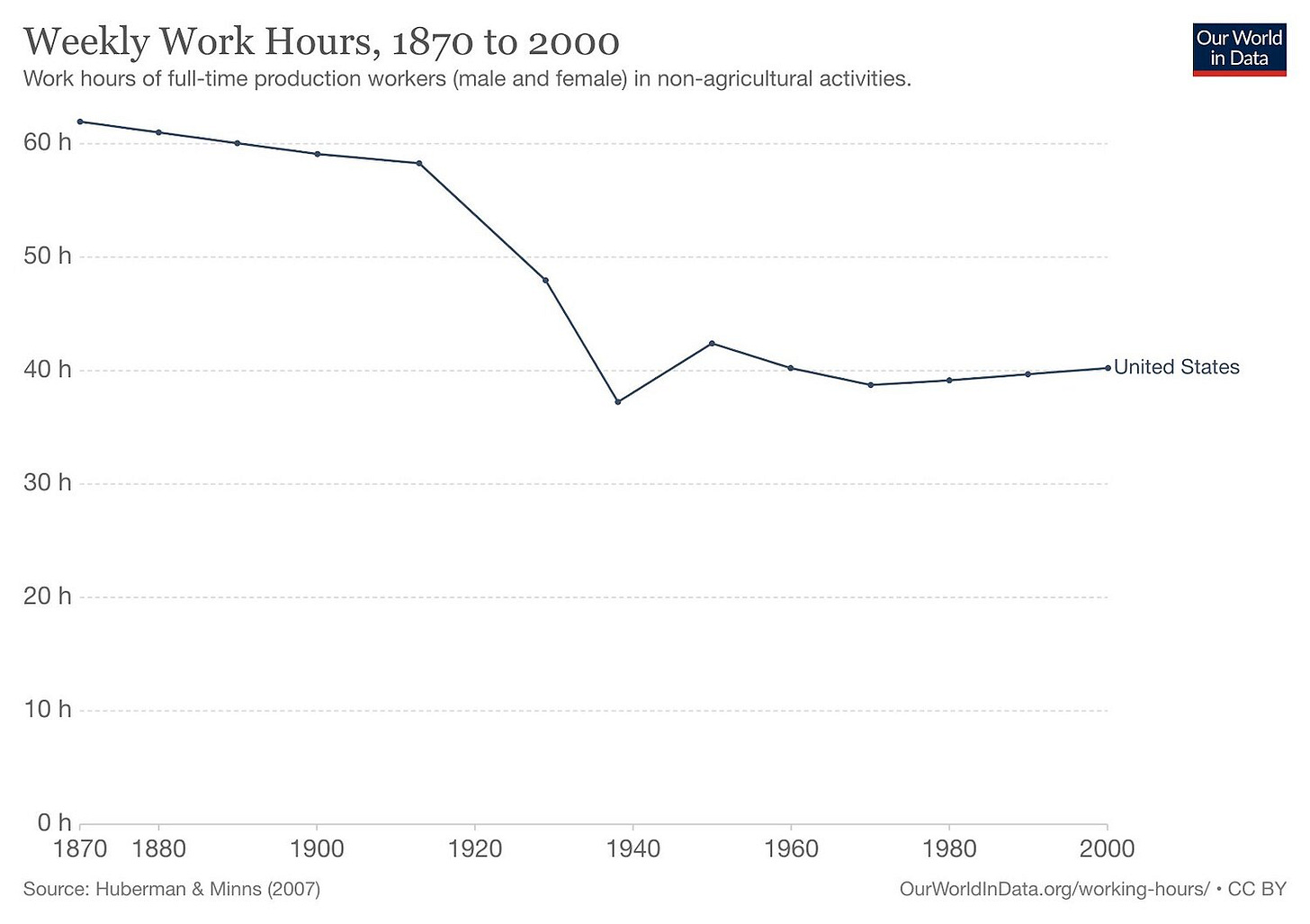
The point of work was once to buy more freedom and that we should again keep pushing down the length of the workweek.
The Workweek Is A Industrialization Frame
Debates over the standard workweek are much more contentious in places where they are focused on industrializing through manufacturing and growth. Thus is it no surprise to find that the US passed a standard 40-hour workweek in 1940 right before white-collar work exploded. In East Asia, where the last fifty years have been focused on “catch up growth,” workweeks were heavily regulated. Taiwan only shifted to a five-day workweek in 2000 and went from 48 hours to 40 in 2017. South Korea still has a 52-hour workweek. With some exceptions, when countries get rich, people demand more time off.
This is one of the things that complicates the arguments around the four-day workweek, the fact that we live in a globally connected system. People in rich countries want more time off to enjoy the wealth of their nation but this means it’s at the expense of longer workweeks in poorer countries that are industrializing like Bangladesh, Vietnam, China, and India.
That’s an oversimplification but it’s worth considering when we are talking about the length of the workweek.
In Modern Economies, Most People Don’t Work 40 Hours
The current debate about the four-day workweek is flawed. There is no standard workweek.
This is especially in advanced, diverse economies like the US. Let’s look at the breakdown of hours for full-time and part-time workers.
The US economy is really made up of four different types of workers:
Full-time employees who are fine with uncapped hours
Full-time employees who would like to work less
Part-time employees who want to work more
Part-time employees who are fine with how much they work
Let’s look at each of these and see what they how they might think about the 4-day workweek
Full-time employees who are fine with uncapped hours: Many full-time employees working much more than 40 hours. This has very little to do with any hour requirements and much more to do with status, power, happiness, and financial opportunity. Some people love working a ton. To cap their workweek would be immoral. This group laughs at the four-day workweek. This will make it easier for them to crush it and capture more opportunities.
Full-time employees who would like to work less: These are the people with kids, in the middle of their careers, the dual-income couples, and knowledge workers who sense that that the 5-day workweek no longer fits how we live our lives or how we work. Or they just like rooting for less work. Many of these people had existential crises during the pandemic and found their jobs were doing much less for them than they thought. This is the most enthusiastic group of 4-day workweek supporters.
Part-time employees who want to work more: Many part-time employees are working less than 30 hours a week and want to work more. This can be due to aggressive scheduling algorithms, attempts to avoid paying for healthcare, or lack of work. They don’t really understand the 4-day workweek debate. They just want to make a little more money.
Part-time employees who are fine with how much they work: This category is ignored in almost all conversations around workweeks, and jobs. These are the gig workers, 2nd income earners, solopreneurs, indie consultants, and part-times that have exactly what they want from work. They don’t fit into conventional beliefs or political narratives around work and are okay with this. They like being able to fly under the radar and do their thing. They laugh at the 4-day workweek debate and are for it, but don’t really care if it happens.
Now that we understand who wants the four-day workweek, why do so many people have an automatic negative reaction to the idea?
Less Work = Less Money, Right?
When companies were pressured to move from six days to five days, business owners were confident that it would devastate the economy. It didn’t.
Similarly, many people make a simple productivity argument when they hear about the four-day workweek. Fewer days = less money. This is not always true.
I interviewed Tash Walker last year who runs a consultancy in London. She moved her entire firm to a four-day workweek and found that she had happier workers, without sacrificing financials. Some of their results include: revenues up 57%, absenteeism down 75%, doubled the number of clients, and client referrals up 50% (you can listen to our conversation here).
Other experiments in Iceland, New Zealand, Japan, and the US have discovered similar results.
One of the best arguments for the four-day workweek is that it is a forcing function for prioritizing work. This is what Kris Kniles found when he worked four day weeks during the summer while at Basecamp:
The key is in the constraint..Removing a day each week forces you to prioritize the work that really matters, and let the rest go. It’s not about working faster, but learning to work smarter. It’s about honing your prioritization, scope hammering and judo skills.
But does moving to a four-day workweek make sense in the modern knowledge economy? While people get one more day of “leisure” per week, they are still living in a system that looks at work as something that should be done every week of the year, most days of the week.
This is why I think the four-day workweek should be seen as a gateway towards seeing the hours, days, and weeks people work as another variable in building a company and trying to do what it is aiming to do for its customers.
A company called Tower is doing such an experiment, trying out a five-hour workday. They expected gains in some parts of their company but expected the fulfillment center to take a hit. It didn’t and it surprised them:
“The warehouse guys were rolling their eyes when we first rolled this out, but the biggest gains were actually there,” he says. “It had taken them five minutes per package to ship before, but within a few weeks they had got that down to less than three minutes. They were doing stuff that real productivity experts would do. I told them they had a constraint and it forced them to creatively think.
I also talked to Sean McCabe a couple of weeks ago who instituted six weeks on, one week off rhythm in his company. McCabe, a self-described productivity junkie was hesitant about doing this but has been “pleasantly surprised” but how smooth it has gone and that “for us, it is a constant, but I think creativity thrives within constraints.”
I think this kind of schedule is a lot more promising because it designs around the type of work the company is doing (in McCabe’s case, it is digital, creative, and often involves sprints) rather than anchoring to how things were done in the industrial economy.
Anyone who’s worked at a large company knows the pain of showing up to a meeting to discuss an initiative that's been in motion for 18 months with no end in sight. This is downstream of 75+ years of assuming that you have to work non-stop for most fo your adult life. What’s the rush?
Yet as the bar on knowledge work is being raised, creative business builders are considering any variable to build the best company and this means being willing to question sacred beliefs like the workweek. We are no longer pumping out the same Model T over and over again, we are often in the business of doing things that are creative, remarkable, and inspiring.
This is the flaw in the four-day workweek argument. It centers on the day as the right metric of work. A better frame is likely a week, month, or project period. This is what the consulting industry has been doing for decades. At big consulting firms, the project period is three months and after these projects, consultants are usually allowed to be “on the beach” (read: do whatever for a few weeks), until they find a new project. A lot of people opt-out of the “on the beach” time because they want to get involved in other projects at work and compete for promotions and raises. Nonetheless, I think more companies will experiment with this on/off type of schedule in the future.
“We are going to find people wondering what to do" - JFK
I’ve probably had over twenty conversations around work where people have commented in some form, “what would I do if I didn’t work?” This is often unprompted and I’ve heard it in enough countries that there must be something to it.
Similarly, when people hear about a four-day workweek, they have an impulsive negative reaction. They don’t like the idea of people working less but don’t know why they feel that. They can come up with reasons but they are often a little messy.
JFK, talking about advances in automation, once commented, “we’re going to find the workweek reduced...we are going to find people wondering what to do.”
What will people do?!
This concern only seems to exist when people design their entire lives around work. Having operated in the shadow world for the past few years, the answer is that they’ll find plenty of things to do. They’ll dance, do art, sing, write, volunteer, play video games, take naps, spend time with their kids, read books, watch TV, launch companies, write books, and yes, work.
I think this wide range of activities gets lost in the conversation about more or less work. We put enormous social pressure on people to ignore all thoughts about things they want to do that don’t pay a wage. I think this debate about a four-day workweek only makes sense if we can expand our imagination of work to align with what Eleanor Roosevelt once reflected on as something that drives happiness:
"But there is another basic requirement, and I can’t understand now how I forgot it at the time: that is the feeling that you are, in some way, useful. Usefulness, whatever form it may take, is the price we should pay for the air we breathe and the food we eat and the privilege of being alive. And it is its own reward, as well, for it is the beginning of happiness, just as self-pity and withdrawal from the battle are the beginning of misery."
We all want to feel useful and that’s what many of us are trying to achieve with work. But our insecurity around this fact, that we need to feel part of things, often gets in the way of talking about what we are really doing working 5-days a week in the same way that people worked manufacturing lines 100 years ago.
The work has changed but we have not.
In A World Dominated By Work Do We Know What We Want?
An interesting way to survey people about work is to ask them to self-report their moods on a daily basis. This gets over some of the flaws in the priming that comes with surveys. This is what Gallup has been doing with its well-being index and it has found that people are happiest during holidays and weekends. Here is an example from 2014:
I think that we have been working non-stop, year-round for so long that we have a hard time knowing what we really want, how much we want to work, and how to start tinkering.
Yet, it’s time to tinker!
The four-day workweek is framing from the 1930s labor vs. manufacturing owners’ view of the world. The four-day week is only one answer to the question “how do we do the best work possible” and build an amazing company.
I’m excited to see what people come up with.
Thanks For Reading
My Freelance Consulting Skills Course is live. You can grab it for $99.
If you'd like to support my work, consider using my affiliate links which will give me a nice kickback:
Podia - 14-day free trial
Teachable - 14-day free trial
Wealthfront - $5k managed for free
ConvertKit - First 1k subscribers for free
Charles Schwaab No International ATM Fees
If you are thinking, I want to give Paul a small monthly boost of confidence and a nudge that says “keep going” then feel free to become a paid subscriber. Don’t worry 99% of everything will remain free, so if that’s too much just let me know what you think!



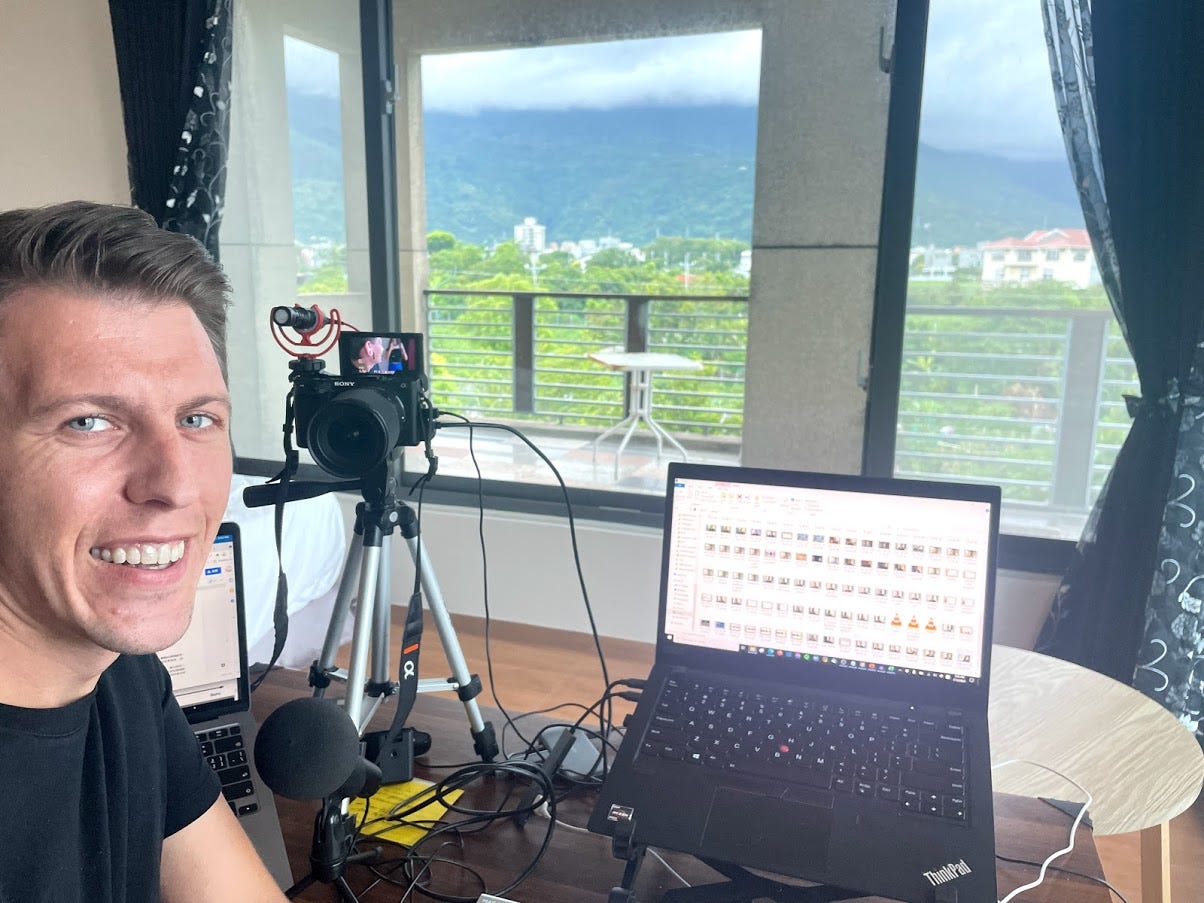
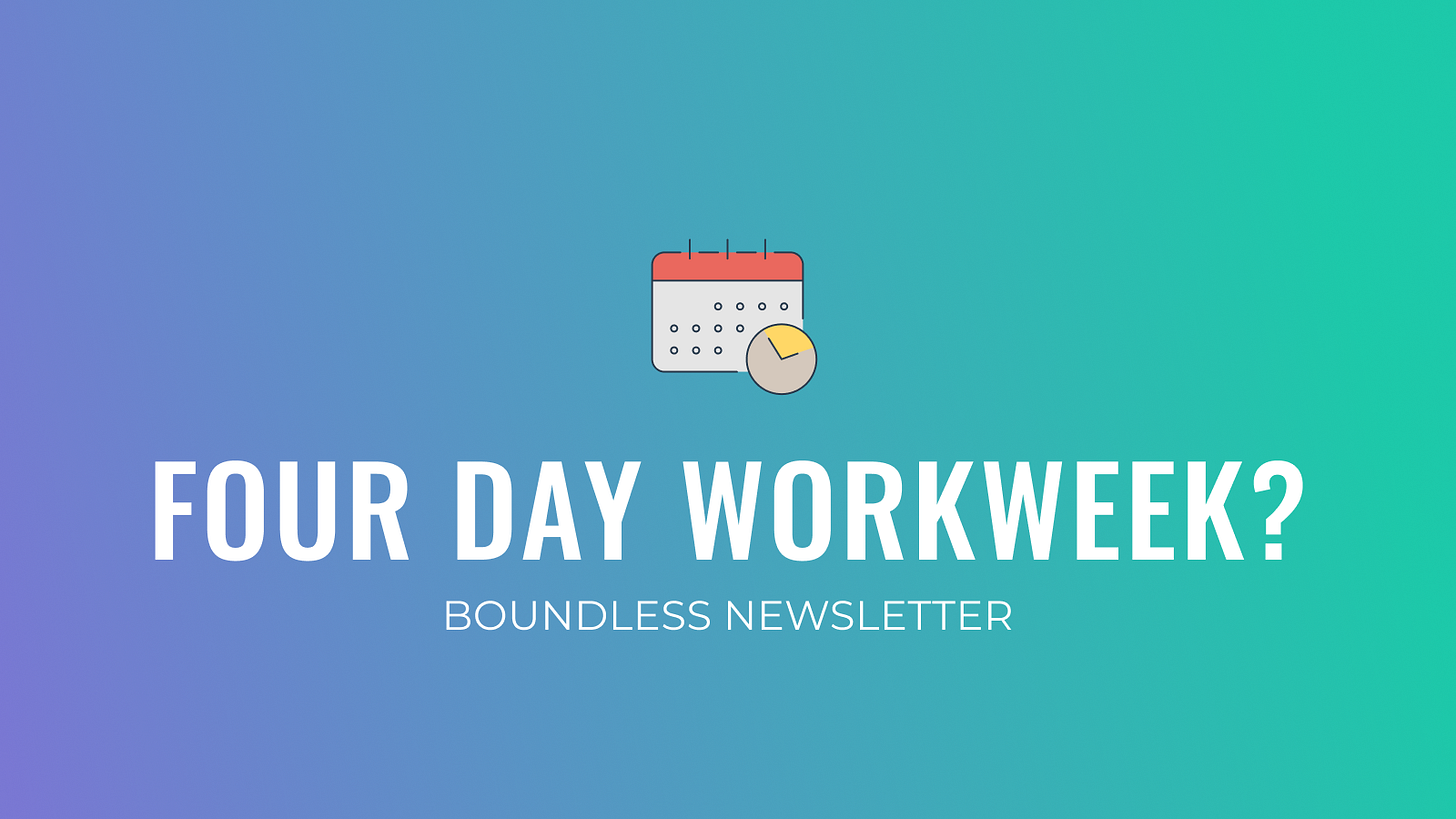
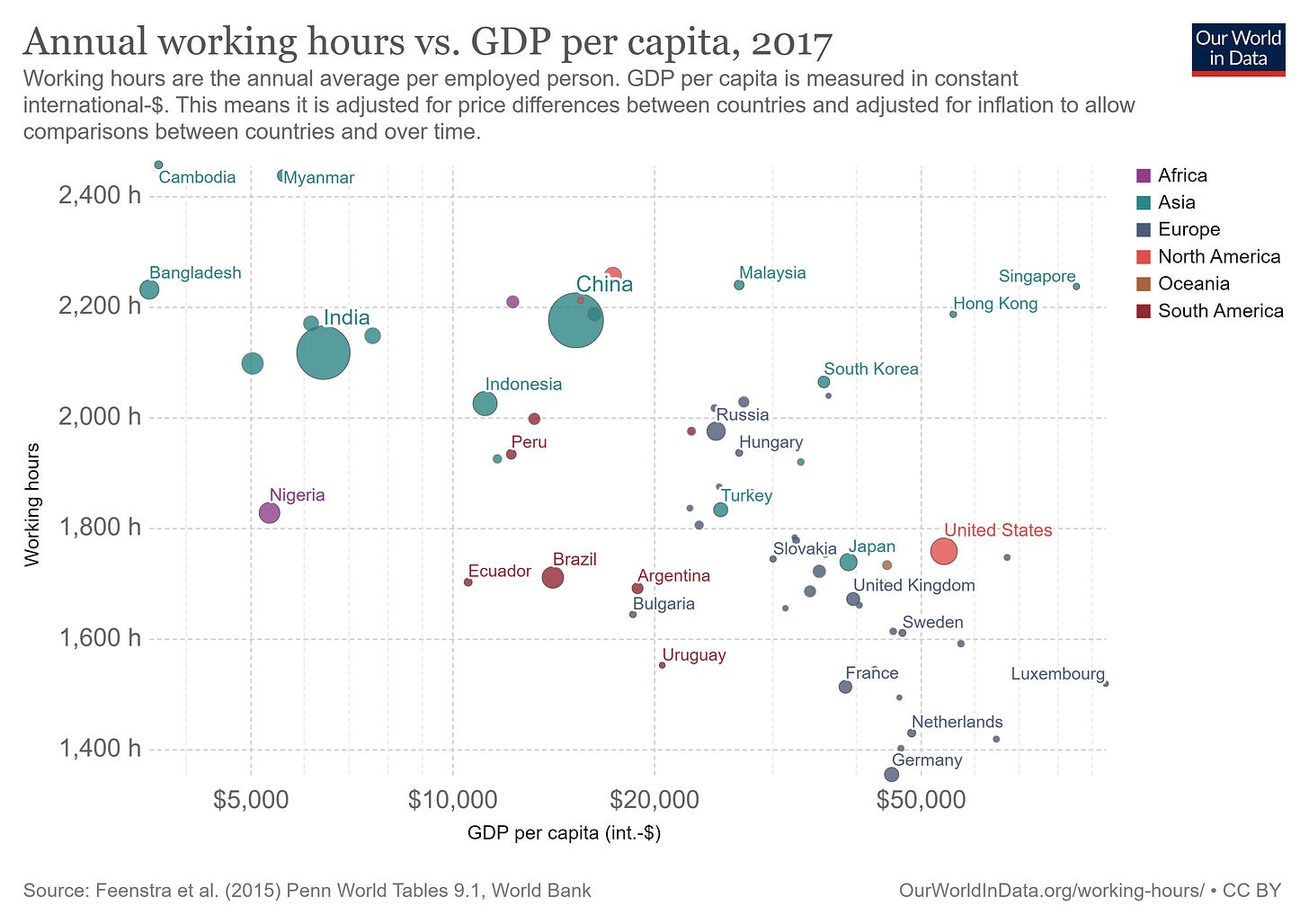
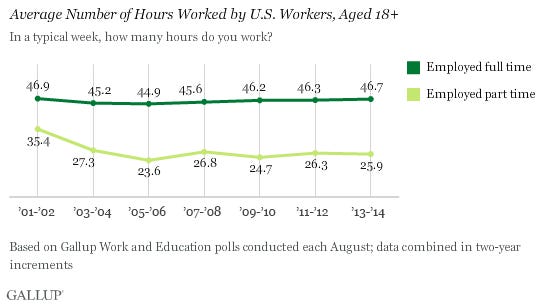
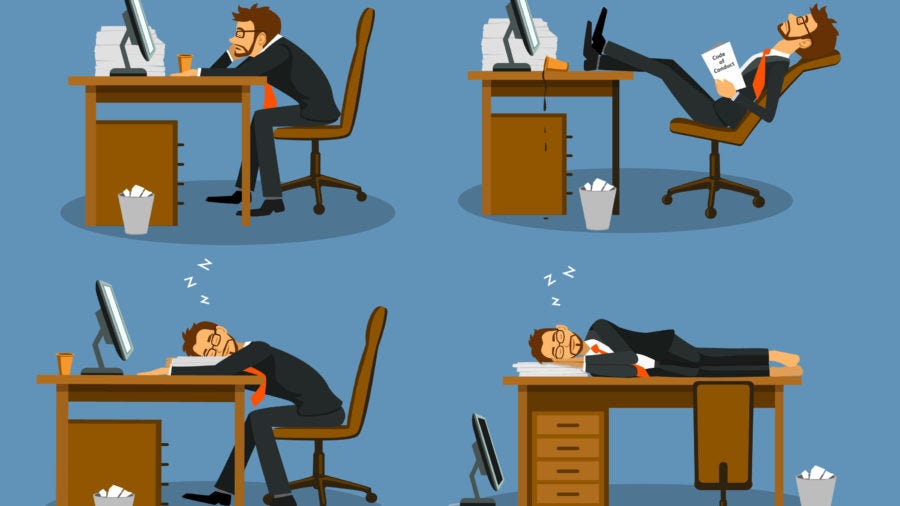

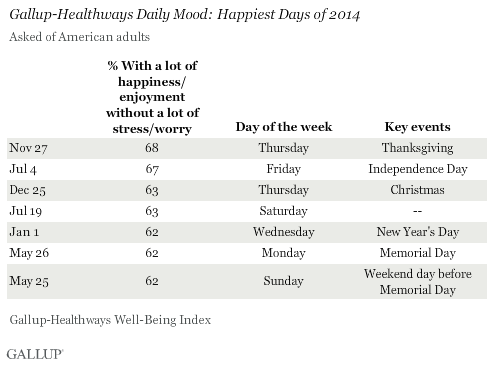
Hang on: "but this means it’s at the expense of longer workweeks in poorer countries"...you make a statement of correlation without any evidence of any correlation.
Great post, Paul! I loved "I never imagined that I’d stumble upon a completely different relationship with work, once where I like what I’m doing, how I do it (solo), and don’t care when it happens (wrote most of this today, a Saturday)." Exactly how I feel. It's validating when someone articulates what's in your soul. Thanks!
Also love the idea of a sabbatical, can't wait to see it play out for you. I did a Selfish Sabbatical last summer and it was glorious. If you wanna peek: https://macncheeseproductions.com/selfishsabbaticalreturn/
Appreciate all the thought you put into your shares.